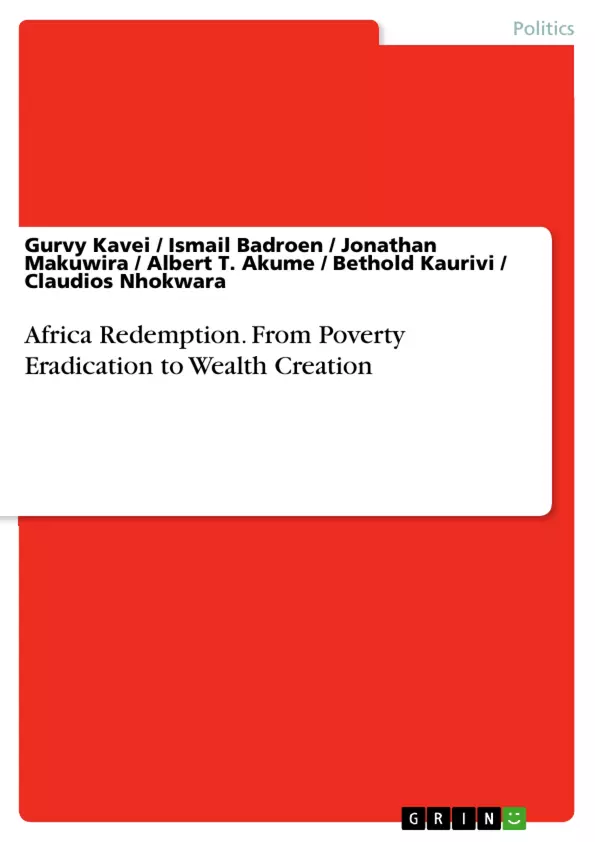Research has shown that poverty is a man-made phenomenon. Historical interventions to redress its rampant manifestation, especially in Sub-Saharan Africa, very much remain a serial flaw of misplacements in the hands of wrong architects and premised on the unholy misconception that aid will lead to both poverty alleviation and economic development of Africa.
Looking at the historical landscape of the poverty debate in Sub-Saharan Africa, one cannot help but notice the silence or scarce mention of entrepreneurship as the engine for growth in the alleviation of extreme poverty. Therefore the Africa Redemption International Conference (ARIC) was conceived from the premise of a long and hard look at the serial and regrettable failures of the three salient beaten-trek interventions of Structural Adjustment Programs (SAPS), Poverty Reduction Strategies (PRS) and the Millennium Development Goals (MDGs).
Earlier interventions focused more on economic growth and paid little attention to social development. With the advent of MDGs, attention somewhat shifted towards resulting in poverty being reduced by more than half between 1990 and 2015. Critical success factors including infrastructure development, domestic resource mobilization, and institutional capacity building, among others, have largely been overlooked by most of these instruments. The architecture of poverty reduction strategies has, for far too long, been the work of foreign agents with little, if any, of Africans themselves.
It is generally on this very basis that the ARIC Conference was convened with the objectives to:
a. Bring academics, practitioners and policy-makers into one unique place to deliberate on issues that keep Africa behind any other parts of the world in emerging out of poverty.
b. Allow policymakers to chart a way forward and share that with the broader body of light-minded Africans who want to seriously take the country of scourges of poverty
c. Allow academics to analyze, articulate and recommend what they perceive Africa needs to do in order to overcome its stagnation that has earned its Mantra of a Dark Continent.
d. Invite development activist in the world and Africa, in particular, to share their isolated experiences with a broader community of stakeholders willing to amplify their good practice efforts to other parts of Africa where they are needed most.
e. Showcase domestic innovators of all sorts
Inhaltsverzeichnis (Table of Contents)
- Foreword
- Preface
- Chapter 1: Introduction: Poverty Eradication as a Panacea for Sustainable Development in Africa
- Chapter 2: The Reality of Poverty in Africa: Causes and Consequences
- Chapter 3: The Role of Education in Poverty Eradication
- Chapter 4: The Role of Agriculture in Poverty Eradication
- Chapter 5: The Role of Technology in Poverty Eradication
- Chapter 6: The Role of Infrastructure in Poverty Eradication
- Chapter 7: The Role of Governance in Poverty Eradication
- Chapter 8: The Role of the Private Sector in Poverty Eradication
- Chapter 9: The Role of Civil Society in Poverty Eradication
- Chapter 10: The Role of International Cooperation in Poverty Eradication
- Chapter 11: Towards a Sustainable Development in Africa: Policy Recommendations and Strategies
- Conclusion
Zielsetzung und Themenschwerpunkte (Objectives and Key Themes)
This book, "Africa Redemption: From Poverty Eradication to Wealth Creation," is a compilation of research, insights, and recommendations from African academics gathered at the Africa Redemption International Conference on Poverty Eradication in 2016. It aims to contribute to the ongoing discourse on poverty eradication in Africa, offering practical solutions and strategies based on the collective knowledge and experience of African scholars. The book seeks to present a comprehensive picture of the challenges and opportunities facing Africa in its pursuit of sustainable development and prosperity.
- The multifaceted nature of poverty in Africa and its root causes.
- The role of various sectors, including education, agriculture, technology, and infrastructure, in tackling poverty.
- The importance of good governance and effective policies in fostering development and poverty reduction.
- The need for collaboration between governments, private sector, civil society, and international partners.
- Strategies for achieving sustainable development and wealth creation in Africa.
Zusammenfassung der Kapitel (Chapter Summaries)
The book commences with an introduction that underscores the significance of poverty eradication as a foundation for sustainable development in Africa. The subsequent chapters delve into the complexities of poverty in Africa, exploring its causes, consequences, and potential solutions. Chapter 2 examines the multifaceted reality of poverty in Africa, highlighting its social, economic, and political dimensions. Chapters 3 through 7 analyze the critical roles of various sectors, such as education, agriculture, technology, infrastructure, and governance, in promoting poverty reduction. These chapters explore the specific challenges and opportunities within each sector, offering potential solutions and best practices.
Schlüsselwörter (Keywords)
Poverty eradication, sustainable development, Africa, education, agriculture, technology, infrastructure, governance, private sector, civil society, international cooperation, wealth creation, Harambee Prosperity Plan, Africa Agenda 2063.
Frequently Asked Questions
What is the main premise of the "Africa Redemption" book?
The book argues that poverty is a man-made phenomenon and suggests shifting the focus from foreign aid to wealth creation and entrepreneurship in Africa.
What was the goal of the Africa Redemption International Conference (ARIC)?
The goal was to bring together academics and policymakers to discuss strategies for overcoming stagnation and promoting sustainable development in Africa.
Why are foreign aid interventions criticized in the text?
The text states that aid-based strategies like SAPs and MDGs often failed because they were designed by foreign agents without sufficient African involvement.
What roles do agriculture and technology play in eradicating poverty?
Both are identified as critical sectors that can drive economic growth, improve food security, and create domestic resources for sustainable development.
What is the "Harambee Prosperity Plan"?
It is one of the specific development frameworks mentioned in the book as a model for achieving prosperity and effective governance in Africa.
- Quote paper
- Gurvy Kavei (Editor), Ismail Badroen (Author), Jonathan Makuwira (Author), Albert T. Akume (Author), Bethold Kaurivi (Author), Claudios Nhokwara (Author), 2022, Africa Redemption. From Poverty Eradication to Wealth Creation, Munich, GRIN Verlag, https://www.grin.com/document/1252670



